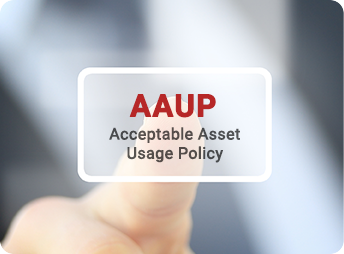1. Objective
The objective is to embody principles of appropriate use of Integra assets and to protect the company and its employees from its misuse. Employees and users must adhere to this Acceptable Asset Usage Policy.
Failure to comply with this policy amounts to misconduct and would result in disciplinary action against the accused that could include termination of employment.
2. Scope
The scope is applicable to all employees and users of Integra who are authorized to use information and information processing facilities and equipment, email, and internet facilities of the company.
3. Reference
Standard: ISO 27001:2022 Information Security Management System
Controls: A 5.10
4. Definition
Acceptable asset usage policy gives an overview of high-level requirements that specify how information and information processing facilities and equipment are managed and who may access information and information processing devices and under what circumstances in Integra’ premises.
5. General Principles
5.1 User
Responsible for:
Human Resource
Responsible for:
5.3 CISO/ISMG Team
Responsible for:
6. Acceptable use policy standard
6.1 Confidentiality of Information
Information stored on workstations, servers and secondary storage devices of the company is considered as the property of the company. User must not use organizational information for any purpose, other than business duties.
6.2 General Use and Ownership
While company network administration desires to provide a reasonable level of privacy, users should be aware that the data they create on the corporate systems remains the property of the company. Because of the need to protect company’s network, management cannot guarantee the confidentiality of information stored on any network device belonging to the Integra.
Employees are responsible for exercising good judgment regarding the reasonableness of personal use. Integra recommends that any information that users consider sensitive or vulnerable must be encrypted.
For security and network maintenance purposes, authorized individuals within Integra shall monitor equipment, systems and network traffic at any time.
6.3 Security and Proprietary Information
Use encryption of information as and when required in compliance with Integra Data classification policy.
All hosts used by the employee that are connected to the Integra Internet/Intranet/Extranet, whether owned by the employee or the company, shall be continually executing approved virus-scanning software with a current virus database, unless overridden by departmental or group policy.
Employees must use extreme caution when opening e-mail attachments received from unknown senders, which may contain viruses, e-mail bombs, or Trojan horse code.
6.4 Unacceptable Use
The following activities are, in general, prohibited. Employees may be exempted from these restrictions during the course of their legitimate job responsibilities. Under no circumstances is an employee of Integra authorized to engage in any activity that is illegal under local, state, national or international law while utilizing the company-owned assets.
The lists below are by no means exhaustive, but attempt to provide a framework for activities which fall into the category of unacceptable use.
System and Network Activities:
The following activities are strictly prohibited, with no exceptions:
Email and Communication Activities:
6.5 Monitoring
Integra reserves the right to monitor the use of its computer network to ensure compliance with the company’s e-mail policy. This may include the interception and/or reading of any messages sent and/or received.
Employees should not expect that any information or file transmitted or stored through the company’s network will be private.
6.6 Storage & Overuse
All work and project related files need to be stored in the company authorized storage. Sharing of files with other employees is to be done strictly using the above said fileserver. Files residing on the desktop are not considered to be critical and won’t be backed-up.
Unnecessary emails should be deleted for both security reasons and to free up space on the network. Employees should limit their use of the internet and e-mails to what is reasonably necessary to ensure that time is not spent unproductively, so that unnecessary costs to the Company and “clogging up” the network is minimized.Integra Global Solutions
6.7 Secondary and Removable Storage Media
Integra restricts the use of secondary storage media (such as USB drives, CD/DVD writers, etc.)
If Secondary Storage media is the asset of our organization which can be accessed by the IT Support team with the approval of IT Head.
List of people authorized to bring secondary media is available with IT Head. These people can bring secondary storage media inside the premises once entry is made in the register provided with the Admin. Other employees need to seek the permission of CISO or reporting manager prior to bringing the media inside and outside the premises.
Regular checks for compliance will be carried out by ISMG/CISO and non-compliances will be raised to management if required.
6.8 Personal Belongings
The employees are allowed their personal belongings inside the premises of the company but this can be kept only in their personal cabinets and they cannot bring in the same to sensitive areas like server rooms, production area etc.
